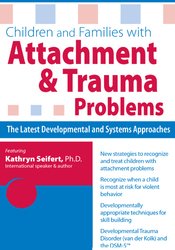
| File type | File name | Number of pages | |
|---|---|---|---|
| Manual | 71 Pages | Available after Purchase | |
| Manual (3.3 MB) | 70 Pages | Available after Purchase |

Kathryn Seifert, PhD, is a psychologist in Maryland and one of the leading experts in the fields of multi-victim violence, bullying, trauma and mental health related violence in the United States. Dr. Seifert specializes in the assessment and treatment of individuals who are at risk for violence and those who are emotionally disturbed, behaviorally disordered, victimized, delinquent, and/or suffering from attachment disorders.
Dr. Seifert has appeared on CNN, Discover ID, and Fox News and consults with numerous public agencies. She testifies in courts as an expert on the maltreatment of children and has a blog, Stop the Cycle, on Psychologytoday.com with over a half million readers.
Dr. Seifert has written two books, How Children Become Violent (Acanthus, 2006) and Youth Violence: Theory, Prevention, and Intervention (Springer, 2015). In these two books, she wrote about the groundbreaking research such as the ACE’s research out of the CDC, connecting child maltreatment, delays in the development of coping skills, and youthful violent behaviors. Dr. Seifert also developed the CARE-2, Child and Adolescent Risk/Needs Evaluation.
Speaker Disclosures:
Financial: Dr. Kathryn Seifert is the Chief Executive Officer and Founder of Eastern Shore Psychological Services; and CARE-2, LLC. She receives royalties as a published author. Dr. Seifert receives a speaking honorarium and recording royalties from PESI, Inc. She has no relevant financial relationships with ineligible organizations.
Non-financial: Dr. Kathryn Seifert has no relevant non-financial relationships.
Access never expires for this product.
Overview
Assessment
Treatment
| 5 |
|
| 4 |
|
| 3 |
|
| 2 |
|
| 1 |
|
Satisfaction Guarantee
Your satisfaction is our goal and our guarantee. Concerns should be addressed to: PO Box 1000, Eau Claire, WI 54702-1000 or email info@pesi.com.au.
Please wait ...